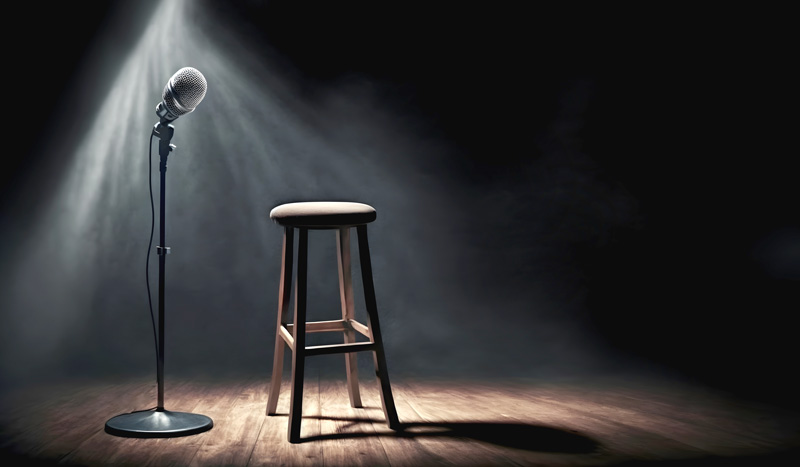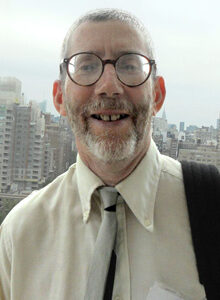While performing comedy at hotels in the Catskill Mountains of New York, Rodney Dangerfield first complained in the 1960s, “I don’t get no respect.” Born “Jacob Rodney Cohen,” he was one of many Jewish comedians, such as Jackie Mason, George Burns, Mel Brooks, Carl Reiner, and Sid Caesar, who helped transform the Catskills’ dairy farms of the mid-20th-century into the “Borscht Belt,” a haven for vacationing Jews who were not welcome elsewhere.

Thus, it’s poetic justice that six decades later, several people living with mental health challenges glibly proclaimed their self-respect by performing mental health comedy on the stage of the Villa Roma Resort in Callicoon, NY, not far from where Jewish dairy farmer Max Yazgur hosted the Woodstock Festival in 1969.
For the 10th year in a row, David Granirer, a Vancouver-based comic with a diagnosis of mental illness, taught participants in the annual conference of the Alliance for Rights and Recovery, formerly the New York Association of Psychiatric Rehabilitation Services (NYAPRS), how to knock dead an audience of their peers on September 27, 2023, with the kind of self-deprecating jokes that made those Jewish comics famous.
While I went on to little fame and no fortune as a member of the first class of NYAPRS’ crack-up artists in 2014, I have lived to tell the tale of Stand Up for Mental Health (SUMH). In his one-man comedy classroom, David has trained some 500 peers online since 2004, leading to hundreds of shows in tens of venues that he has then stage-managed in person.
His students have not only performed at mental health conferences like NYAPRS’ but also for other behavioral health programs, colleges, corporations, and governments throughout North America and Australia, including the U.S. Secret Service. Of course, their most important audience is the general public.
One technique I learned from David is that for maximum impact (and rhythm), a punch line should have a series of three rejoinders. So, I asked him, “What are the three primary impacts of SUMH?” Without missing a beat, he replied:
- Building confidence and self-esteem: Performing is life-changing, making many peers feel they can do anything. (One of his students has become a comedy headliner.)
- Tackling public stigma: So-called “normal” audiences are shocked to learn that, for instance, a guy with schizophrenia can be funny.
- Laughing is therapeutic: It’s a high that is free, legal, and without side effects (other than those listed above).
To quote from his website, “We use comedy to give people with mental health issues a powerful voice and help reduce the stigma and discrimination around mental illness. The idea is that laughing at our setbacks raises us above them. It makes people go from despair to hope, crucial to anyone struggling with adversity. Studies prove that hopeful people are more resilient and tend to live longer, healthier lives.”
He “got the idea for Stand Up For Mental Health™ from watching students in his Langara College Stand-Up Comedy Clinic course. ‘Though Stand-Up Comedy Clinic isn’t intended as therapy, I’ve had students overcome long-standing depressions and phobias, not to mention increasing their confidence and self-esteem. There’s something incredibly healing about telling a roomful of people exactly who you are and having them laugh and cheer.’”
“There’s something amazing about having members of your community take the stage at an event and rock the house. It’s incredibly empowering and a great way of fighting public stigma. Most so-called normal people would never want to go anywhere near stand-up comedy. Seeing people with mental illness do it forces the audience to re-evaluate their perceptions of and prejudices against people who have a mental illness.”
Granirer credited Harvey Rosenthal, CEO of NYAPRS, with recruiting peers with innate talent as cutups. This year’s crop consisted of Luke Sikinyi, Chacku Mathai, Becca Atkins, Stephen Nawotniak, and Helen “Skip” Skipper, reflecting the diversity of NYAPRS’ membership.
Said Rosenthal, “David and his yearly group of brave and bold comedians have played a central role in bringing fun and laughter to hundreds of conference attendees for well over a decade. Together, the BBQ and comedy show have always represented the high point of the conference. I don’t think anyone in our broader NYAPRS family could imagine a conference without our mental health comedy performers….and I don’t expect they’ll have to.”
While this year’s class may be considered “old-timers,” Granirer has worked with the young adults of OnTrackNY, the program for peers experiencing altered states of consciousness (aka “psychosis”) for the first time. A day after the NYAPRS conference, he directed their encore performance of “Funny…in my head” at the New York Psychiatric Institute’s Pardes Auditorium.
David’s own “up by the shoelaces” recovery story is instructive because he attempted suicide at age 17 and, as a young guitar player, aspired to rock stardom. Still, a wrist injury ended his nascent career, plunging him into a “huge depression” that lasted several years. At the Vancouver Crisis Center, where his father and brother set an example by volunteering first, he became a volunteer, then a trainer and a counselor.
Always the class clown, he tried out his shtick for amateur nights at comedy clubs but bombed. Then, he took a stand-up course in 1994 and packed the house with family and friends to rousing applause. Voila! A star with bipolar was born.
I tested my hypothesis on David that men either take themselves too seriously or think they are natural comedians. He confirmed that the comedy scene has been predominantly male for years, though women have been making inroads slowly but surely.
In contrast, if the performers listed on www.standupformentalhealth.com are representative, 60% of peers who have the chutzpah to perform mental health comedy are female. This confirms my other hypothesis that because women are socialized to be emotionally transparent, they are best at revealing their distress to an audience rather than keeping it to themselves.
And, if you don’t think Stand Up for Mental Health should be taken seriously, read Andi Cuddington’s M.S. thesis for the London School of Economics and Political Science:
Also, please consult these resources on the health benefits of humor:
- www.verywellmind.com/health-benefits-of-humor-and-laughter-5101137
- www.va.gov/WHOLEHEALTHLIBRARY/tools/healing-benefits-humor-laughter.asp
To book David and his program of “Recovery-One Laugh at a Time,” email david@standupformentalhealth.com. He is also the author of The Happy Neurotic: How Fear and Angst Can Lead to Happiness and Success.
Carl Blumenthal has been a peer specialist in New York for 20 years and is the founder of Beyond Compare Peer Counselors. If you would like an outline of his curriculum, “Humor and the Healing Arts,” email carlblumnthl@gmail.com.




